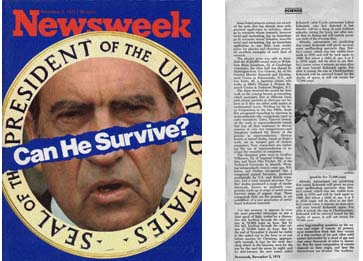

Famous Cases | Historical Tales | Vampires | Zombies
 |  |
Famous Cases | Historical Tales | Vampires | Zombies |
 |
The irony is heavy. An institution that trained three generations of men and women to fight vampires and zombies did such a good job that now there are no more vampires and zombies to fight. As a result, earlier this year President Nixon signed an order eliminating the Academy. The property has been sold to a developer who will build a golf course on the bucolic Academy campus. While most of the FVZA staff has long since gone, Dr. Pecos has chosen to stay to the bitter end. "I haven't been looking forward to this day," says the youthful 46-year-old with a shock of black hair and a mustache. "I suppose that's why I'm the last to leave."
Dr. Pecos arrives at his suite of offices, where two movers have been working all day, transferring the contents of a lifetime into a waiting truck. Dr. Pecos watches over them as they try to maneuver a glass display cabinet through a door. Almost on cue, a mover accidentally slams the case into the doorway. "Be careful with that," Dr. Pecos says, in the stentorian tones of a man used to having his commands obeyed. "What about this stuff," another mover asks, pointing to a stack of boxes. "It's not stuff," Dr. Pecos answers, sharply. The chastened movers shuffle downstairs, leaving Dr. Pecos alone with his memories.
The FVZA was born in the years following the Civil War, when the nation's growing vampire and zombie populations began to threaten national security. Over the next hundred years, the FVZA evolved into that rare government agency that was actually respected by the public. Dr. Pecos himself joined the agency in 1950, after helping to find the vampire vaccine. A self-confessed bookworm, he nevertheless underwent the rigorous agent training and eventually rose to the ranks of regional director before moving on to run the Academy. "This place was humming with a sense of purpose," he remembers, looking out on the campus from his window. "We were training people for a life-and-death struggle, and we never doubted we would win."
The memories seem to enliven Dr. Pecos and soon he is poring through the contents of the dusty boxes scattered about his feet. He pulls out what looks like a small cattle prod and waves it through the air with the deft assurance of a fencing champion. "We were carrying out an extermination at an abandoned mine near Socorro," he recalls, miming the action. "When I crawled into the mine shaft, the floor gave way. I fell about thirty feet, broke my ankle, and when the dust settled I found myself facing four very unhappy vampires with only this to protect me." He grins as he jabs the prod forward. "They didn't even lay a hand on me."
Bravado like that helped the FVZA stem the tide of vampires and zombies that were flooding the country by the end of World War II. But the agency became a victim of its own success. The last confirmed vampire attack in the United States was in 1962, and except for some prominent outbreaks in the east, zombies have disappeared from the landscape. Despite these facts, Dr. Pecos lobbied tirelessly to keep the Academy off the chopping block, pointing to recent vampire attacks in the southern Mexico state of Chiapas. "It's astonishingly naive for us to think that outbreaks in neighboring countries can't reach our borders," he says. "Unfortunately, the next time we have an outbreak, we're going to have to start from scratch."
As for Dr. Pecos, he will be starting from scratch in the private sector. He recently accepted a position across town at the Santa Rosa Institute of Vampire and Zombie Research. The Institute is devoted to studying vampires and zombies for possible medical applications. "It's a very exciting area of research," says Dr. Pecos. "The answers to paralysis, disease, even aging, may rest in the cells of vampires and zombies."
Dr. Pecos is interrupted by a crash outside. He hurries into the hall to find the two movers standing over a pile of boxes that tumbled off their two-wheeler. "I asked you to be careful," Dr. Pecos says, with venom. He stoops to pick up the contents of the boxes, and when the movers try to help, he shoos them away. "I'll take care of this myself." The movers depart, muttering, while Dr. Pecos carefully replaces the items in their boxes. "Some brave people walked these halls," he says. "People who gave their lives for this country. Is it too much to ask for a little respect?"